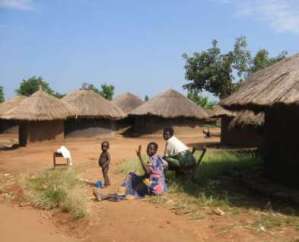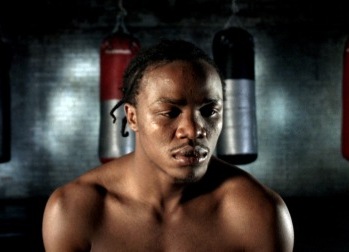Here was a child soldier who had done it on his own: vanquished the brutal past -- with his fists -- to become a grinning cheerful American family man.
But can such trauma really go away? The dead look in the girls' eyes -- despite moments of cheer -- made them look far older than their grandmothers.
Military training means: marching, loading guns, learning how to kill on command. All on a strict schedule that begins at sunrise with prayers.
After six months of training, the children are given their own Kalashnikov and re-enter Uganda to raid and loot their former villages. Some are told to kill their own parents, to burn bridges for possible return.
If a child refuses, the Commando sets the other children on top of him, to trample or bayonet the child to death. Sometimes a child is forced to eat a fellow child with his teeth.
The abuse is more specific for girls: by age ten, they are forced to become "wives" to the Commandos, so as to be a regular source of sex. By their early teens, they are mothers. Each of my students in Gulu had a child or two nestled in her arms. One had twins she lay on a blanket in the grass, without diapers, but a grey rag to wipe their bottoms from time to time.
The terror has not let up in twenty-five years, despite (or because of ?) President Museveni's policies and United States' hefty aid to Uganda. Every evening, hundreds of children embark at sunset on the dusty road out of Gulu, the guarded capital of the north, clutching their book satchels in their hands. I would see them on the road, walking miles to shelters set up to help them avoid abduction. Called "night commuters", these children had to arrive at the shelter before nightfall, because it is at night that the raids take place.
"I escaped during a helicopter bombing", explained more than half of my students. The bombs drop from Museveni's helicopters, and in the havoc and smoke, a few of the more courageous children run for cover.
Like any child, these children use symbols of hope to encourage their escape. One girl saw a blue paw-paw flower growing in the forest and this cheered her to think she could walk, with swollen feet, the four nights home to her former village. 
But once back home, the situation is not much better -- which is why Kassim's success story, in Davidson's film, is so extraordinary. What is not reported in the Western press: in 1994 Museveni forcefully relocated l.6 million Acholi to camps to "protect" them from the child soldiers, turning their farm land into waste, and the economic situation into a desert. Now ninety-five percent of the villagers of north Uganda have been cleared from their homes and live in concentration camps dependent on World Food trucks:
These camps are equivalent to "genocide", according to the Uganda Human Rights Force. The camps are rife with incest, brutality, malnutrition and disease. And sometimes the World Food Trucks don't deliver.
So an escaped child soldier will head for home only to find there no longer is any home.
Nor is there much of an economic system left in north Uganda. The girls I was teaching were being trained to be "tailors" in a town of dozens of unoccupied tailors: learning how to sew without sewing machines and with paper instead of cloth. Ostracized as "devils" and "whores", they also had to find some kind aunt to take them in -- or a charitable organization. Most of their parents were dead, either of "the Disease" (AIDS), murder or starvation.
Not surprisingly, more than a few girls admitted they missed the army: the regular source of food. In fact, some looked forward to joining Museveni's program to take these escaped children -- already trained murderers -- and initiate them into his army: recycle the child as it were, into lifelong killing machines.
Nothing like the girl soldiers I interviewed whose eyes were like pebbles buried in a muddy stream.
Yet Kassim does have one memory which torments him. When he defected from the army, the soldiers came to his family's door and macheted his father to death in revenge. The guilt haunts him so much that he prays every day that his father forgives him.
A more practical question at stake in the documentary: will President Museveni forgive him for his defection and let him visit home?
The denouement of this fascinating film: Kassim not only receives a pardon from Museveni, he is given a hero's welcome back to his home country. Crowds cheer as the world champion grins and waves from a jeep -- or as he bursts in tears at his father's grave. Military men shake his hand.
It seems -- from the film's account -- a quite happy ending.
But why should we cheer about Museveni's pardon? The situation of child soldiers remains the same: and the finger points back -- many argue -- at Museveni himself. I interviewed dozens of government and NGO workers while in Uganda (it easily becomes obsessive) and almost every official I spoke to -- from the director of the UNDP in Kampala to the Human Rights offices in Gulu -- confided that the child soldier situation, ongoing for twenty years, continues unabated because it is convenient for Museveni's third presidency (i.e. "dictatorship"). What is described as a local event in the Western press (Joseph Kony, a madman prophet, felt a calling to "purge" the Acholi people of impurities), turns out to have more to do with the historic divide in Uganda between north and south, a division initiated by the British in the nineteenth century, to better control the tribes and keep up their power.
Now the Ugandan presidents themselves -- from Idi Amin to Museveni -- play on the divisions between the tribes -- and indulge the child soldier massacres.
Child soldiers are politically useful.
"There are many political uses to the conflict,"says Mahmood Mamdani, Ugandan sociologist at Columbia University. "Museveni learned that you needed a war to have access, which the IMF and the World Bank would not inspect." The army supposedly protecting the north from child soldiers -- and funded in part by the United States -- is used for secret incursions into other countries, for gems and arms.
"It is the battalion in the north which became the RPF (Rwanda Patriotic Front) that went down to Rwanda, Congo, Sudan," Mamdani stated pointblank.
A director of an agricultural aid organization met me secretly in a cafe in Gulu, only with the promise that I would not use his name, nor speak at a decibel level higher than a mumble. "This whole conflict is convenient for Museveni," he whispered, the anger intense in his strained face. "The Acholi of the north are his traditional enemy. Museveni, himself was once a guerrilla soldier, fighting them. So now that he's president, what is more convenient than to get them corralled on concentration camps, with the excuse that it's for their own good?"
He added nervously: "Don't you find it strange that this conflict of child soldiers has been going on for twenty years -- and Museveni has all the economic support of the West [fifty percent of his budget] -- and the arms -- to put an end to it?"
It is a fact: 50,000 UPDF soldiers "protect" the north from l0,000 child soldiers -- a disproportion that was explained by a parliamentary member to me as "how clever those children are at hiding!"
"There are many bushes," she told me.
Some of the land seized from the Acholi is now being cultivated by the UPDF soldiers.
............................................................................
I called the Minister of Disaster before I left Kampala. She generously agreed to speak to me, eagerly adding on the phone that she was just then in a meeting with the Prime Minister, and they were setting up a new camp to help the now 20,000 escaped former child soldiers "reintegrate": to teach them agricultural skills.
She added with enthusiasm: "Actually, this camp has another purpose: it will be giving these children an opportunity to re-train as soldiers, and join Museveni's army."
"Kassim the Dream" really is a dream. A miracle of the self-made man, who came out of the African mess, to become a world champion, in the American spirit, and have his own home, family, and bank account.
It is a miracle almost in the same vein as Museveni himself, the touted prized president for the West: Uganda is hailed -- conveniently so -- as the economic miracle of Africa; the "pearl" of the continent, despite the fact that l/3rd of the country lives in camps, protected by government soldiers against their own children. 
